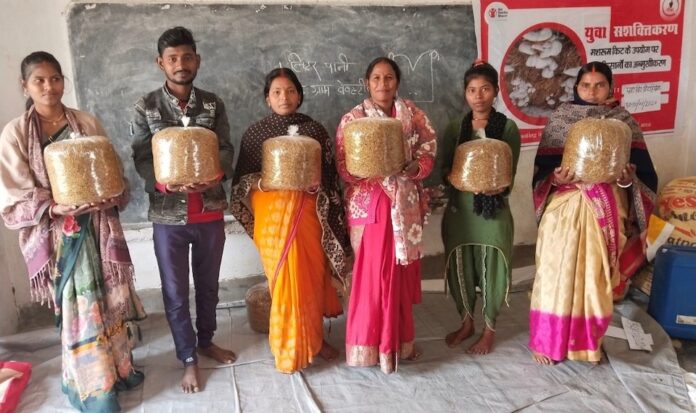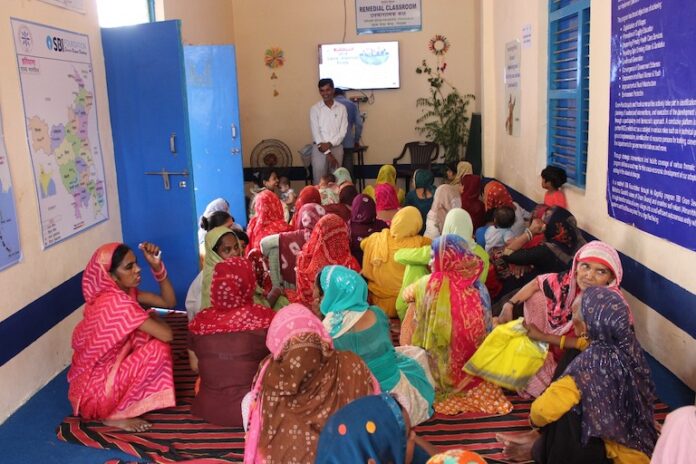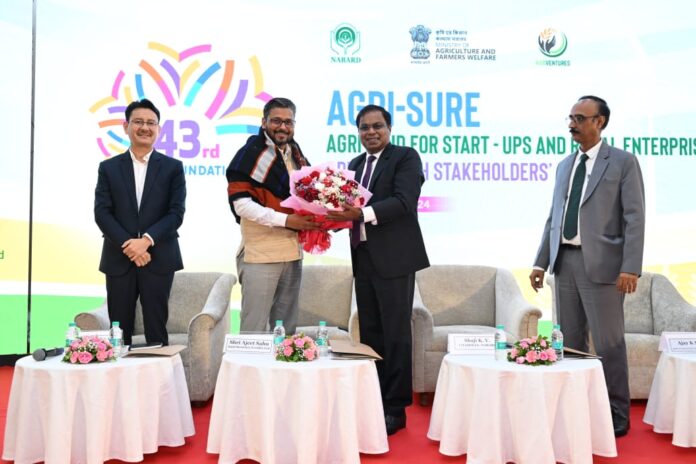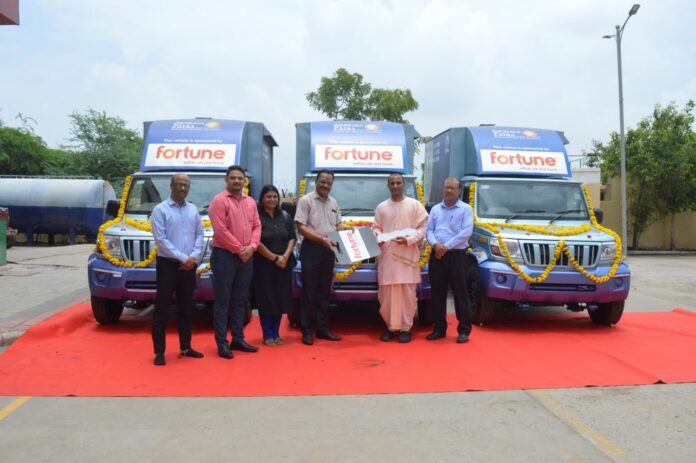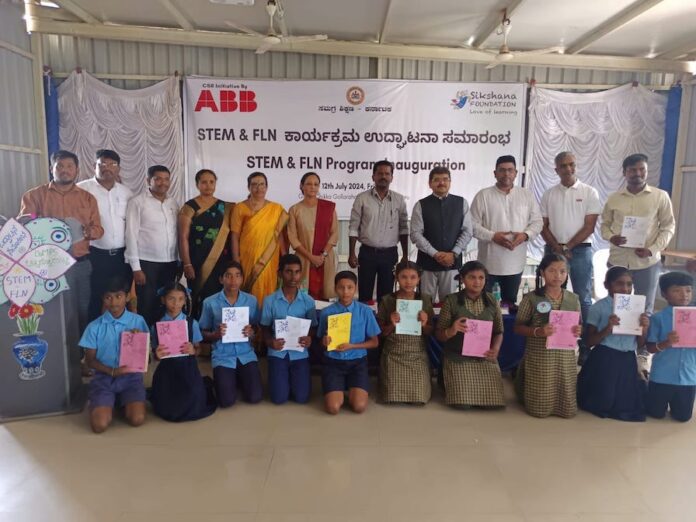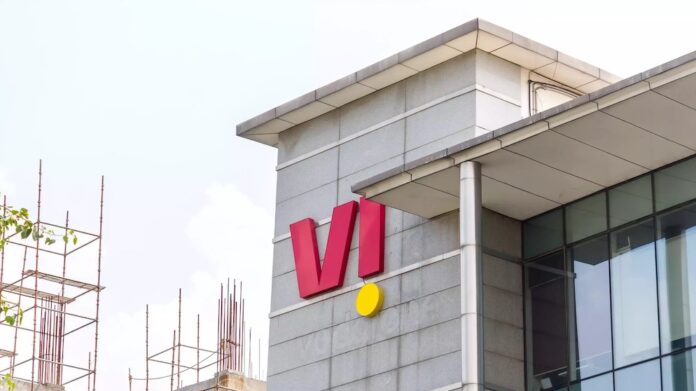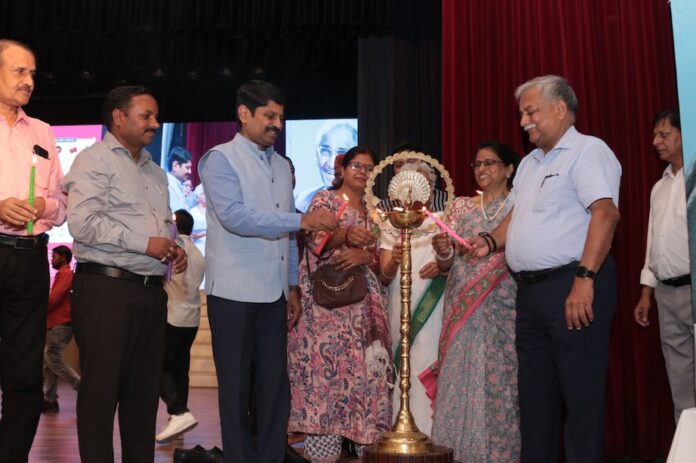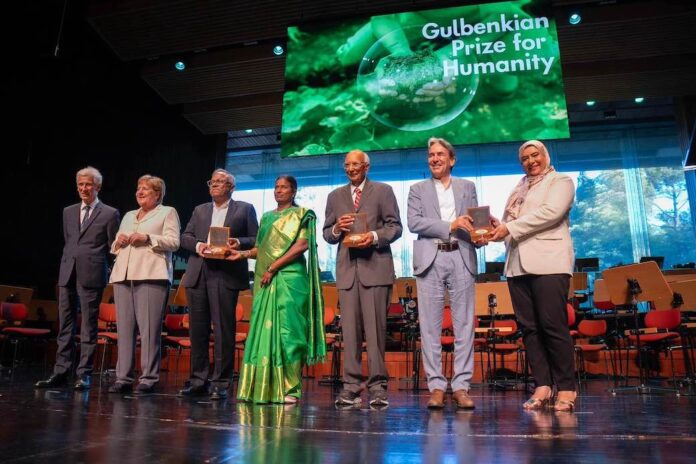How Technology is Shaping India’s Textile Industry
The Indian textile industry’s rich heritage can be traced back to the Indus Valley Civilisation, while modern textile manufacturing flourished in the 19th century. Being one of the biggest employment generator, the textile sector holds immense importance for India’s economic development. As India strives to be Viksit Bharat, the government has laid out ambitious plans to boost exports to $600 billion and expand the domestic market to $1.8 trillion by 2047. As these ideas take shape, technological innovations will play a crucial role.
Historically, the global textile industry has been a hotbed for scientific and technological breakthroughs. During the Industrial Revolution, inventions such as the spinning jenny and the water frame completely changed the production processes. Cut to this date, the industry is undergoing a transformation with a promise to boost creativity, efficiency and sustainability.
The current scenario
Prominent manufacturers all over have embraced automation and adopted digital technologies cutting across processes – from spinning and weaving to dyeing and printing. Needless to say, the production has accelerated and efficiency enhanced while ensuring product quality. This has also reduced operational costs and energy consumption, making India’s textile manufacturing sustainable and more competitive on a global scale.
Advancement in digital printing technologies has considerably widened creative possibilities for designers, allowing them to experiment with bold and innovative designs without limitations on colour usage or repeat size. They can also modify and control the printing process remotely, which reduces costs and time associated with sample production. For manufacturers, the ability to produce millions of shades parallely has helped meet the growing demand for personalised designs and shorter lead times.
Intelligent robotics is another promising area. Robots capable of performing difficult tasks such as fabric cutting and garment assembly with precision and ease have not only enhanced efficiency but also helped manufacturers adhere to stringent safety regulations, leading to safer, more productive work environment.
On the other hand, Virtual Fit software is also helping manufacturers to understand their target consumers better. It uses AI algorithms to create accurate digital representations of customers’ body shapes for better-informed purchasing decisions, in-turn reducing dead stockpiles for textile makers.
Technologies of future
Textile enthusiasts are excited about several emerging technologies that promise to take the manufacturing a notch higher.
Nanotechnology, which deals with materials at the nanoscale, could be of immense value. It enables the creation of fabrics with enhanced properties such as high tensile strength, water repellence and antimicrobial features. For instance, nanotechnology can improve a fabric’s water-repellent properties by creating nano-whiskers that cause water to bead on the fabric surface. While it does not compromise the fabric’s breathability or texture, it ensures comfort and functionality.
Another example is laser technology, which has been an asset to the apparel industry since the 19th century. Laser is used in used in cutting, engraving, and denim fading. It offers a clean, lint-free process that integrates computer design for extreme precision in cutting contours. This technology is now gaining acceptance in garment manufacturing due to its efficiency and versatility across various materials.
The application of 3D printing, also known as additive manufacturing, is another prominent technology that hols good potential for the future. 3D printing allows for the creation of custom, intricate designs that were previously impossible.
Investing in the future
The textile industry has traditionally been product-focused, but this perspective is being challenged due to the rapid pace of advancements in textile technology. Industry leaders have realised this and they have been investing heavily in science and technology to enhance manufacturing processes.
The integration of technology in textile manufacturing is not just about adopting new tools but about reimagining the entire production process. It is about creating a more agile, responsive, and sustainable industry that can meet the dynamic demands of global markets. As technological innovations continue to unfold, the Indian textile industry is well-positioned to leverage these advancements to achieve its ambitious growth targets and reinforce its standing as a global textile powerhouse.
Views of the author are personal and do not necessarily represent the website’s views.
 Mr N Chandran is the Chairman of Eastman Exports. He is a first generation entrepreneur hailing from an agrarian family and the guiding force behind the company’s motto of manufacturing and exporting the best quality and in-trendapparels to global retail giants. Hailing from a humble background, Chandran understands the difficulties faced by the labour force and has hence undertaken a number of initiatives for their well-being, especially for the women workforce. He has also adopted a school which provides free education to underprivileged children.
Mr N Chandran is the Chairman of Eastman Exports. He is a first generation entrepreneur hailing from an agrarian family and the guiding force behind the company’s motto of manufacturing and exporting the best quality and in-trendapparels to global retail giants. Hailing from a humble background, Chandran understands the difficulties faced by the labour force and has hence undertaken a number of initiatives for their well-being, especially for the women workforce. He has also adopted a school which provides free education to underprivileged children.
CSR: Akhil Bhartiya Gramin Uthan Samiti (ABGUS) Raises Awareness About Population Issues
Akhil Bhartiya Gramin Uthan Samiti (ABGUS) NGO marked World Population Day with a dedicated campaign aimed at raising awareness about population issues and promoting sustainable development practices in the region.
World Population Day, observed globally on July 11th each year, serves as a reminder of the importance of population issues and their impact on development initiatives worldwide. ABGUS, known for its commitment to rural upliftment and community welfare, organized a series of events and activities in Nuh, Haryana, to highlight the significance of responsible family planning and sustainable population growth.
The campaign, held at the heart of Nuh district, included educational workshops, interactive sessions, and awareness drives that engaged local communities, stakeholders, and youth groups. Emphasizing the theme of “Sustainable Development through Responsible Population Practices,” ABGUS underscored the importance of empowering individuals with knowledge and resources for making informed choices about family planning.
“We believe that sustainable development begins with informed choices about population growth,” stated Mr. Manoj Yadav, President of ABGUS. “By educating and empowering communities, we aim to foster a future where every individual has the opportunity to thrive without compromising our environment.”
The event also featured discussions on healthcare access, gender equality, and economic opportunities, all of which are intricately linked to population dynamics in rural areas. Participants were encouraged to participate actively in shaping their community’s future by advocating for policies that support sustainable development goals.
Rajesh Verma, Secretary & Executive Director of ABGUS expressed gratitude to all participants, volunteers, and supporters who contributed to making the World Population Day campaign a resounding success. Their efforts underscored the organization’s commitment to creating a positive impact on society through grassroots initiatives and community engagement.
As the day concluded, ABGUS reiterated its commitment to continue working towards a sustainable future where population growth is balanced with the needs of current and future generations.
Disclaimer: This media release is auto-generated. The CSR Journal is not responsible for the content.
Flat-faced dogs are intentionally bred to have a snout so squashed that it’s difficult for them to breathe: PETA India
Delhi, India: Ahead of World Plastic Surgery Day (15 July), People for the Ethical Treatment of Animals (PETA) India is launching a sky-high appeal on Panchkuain Road to remind everyone that while humans may have a choice when it comes to the shape of their nose, pugs and other flat-faced dogs don’t: they’re intentionally bred to have a snout so squashed it’s difficult for them to even breathe – and compassionate people should never buy them.
PETA India’s billboard in Delhi is located on Panchkuain Road, in the direction of Connaught Place. The billboard will also go up in Chennai, Hyderabad, Kolkata, and Mumbai.
“When humans choose to change the appearance of their nose, they can still breathe, but the look breeders are trying to achieve condemns pugs and other flat-faced dogs to a lifetime of suffering and gasping for air,” says PETA India Director of Veterinary Services Dr Mini Aravindan. “PETA India urges everyone to turn their nose up at the cruel breeding industry responsible for pugs’ misery and adopt a dog in need from an animal shelter instead.”
Pugs and other breathing-impaired breeds (BIB), including French and English bulldogs, Pekingese, Boston terriers, boxers, Cavalier King Charles spaniels, and shih tzus, suffer from an agonising and sometimes fatal condition called brachycephalic syndrome, which causes them to pant, snort, wheeze, and struggle just to breathe. It can make chasing a ball, running, playing, and even going for a walk – the things that make dogs’ lives joyful – difficult. The situation is so serious that a number of countries, including Austria, Germany, the Netherlands, and Norway, have banned or are currently working on amendments which either ban or restrict the breeding of some or all BIBs.
PETA India warns that most pet shops and breeders in the country are illegal, as they aren’t registered with the relevant state animal welfare boards. Breeders and pet stores typically deprive dogs of proper veterinary care and adequate food, exercise, affection, and opportunities for socialisation – in addition to fuelling the dog overpopulation crisis.
PETA India – whose motto reads, in part, that “animals are not ours to abuse in any way” – opposes speciesism, a human-supremacist worldview.
Disclaimer: This media release is auto-generated. The CSR Journal is not responsible for the content.
FMCG company collaborates with Akshaya Patra Foundation to support its Mid-Day Meals Program
Ahmedabad, India: Adani Wilmar Limited (AWL), one of India’s largest Food & FMCG companies has collaborated with the Akshaya Patra Foundation to support its Mid-day meal program.
As part of this collaboration, Adani Wilmar will provide mid-day meals to underprivileged school children for one year in schools located in Ahmedabad city. Additionally, the company has also donated delivery vans to facilitate the efficient distribution of mid-day meals daily to schools across in the city. The company’s collaboration with the non-profit trust represents a shared mission to combat hunger and support education.
The flag-off event for the new vehicles took place in Ahmedabad, attended by Mr. Ashok Kumar, Business Head, Food Service Division, Adani Wilmar Ltd. along with Sri Raya Rama Dasa, Vice President of The Akshaya Patra Foundation, Gujarat.
Expressing enthusiasm about Adani Wilmar’s partnership with the NGO, Mr. Angshu Mallick, MD & CEO of Adani Wilmar said, “We are honoured to collaborate with The Akshaya Patra Foundation, an organisation that has made significant strides in tackling hunger and promoting education. At Adani Wilmar, we believe that every child deserves the opportunity to learn without the burden of hunger and we aim to make a tangible difference in the lives of underprivileged children by supporting the Mid-Day Meal Program. These delivery vans will not only ensure a smooth delivery of foods to thousands of school children, but also ensure that they receive the nourishment they need to succeed academically and personally.”
The Akshaya Patra Foundation, headquartered in Bengaluru, runs the Mid-Day Meal Programme in over 24,000 government and government-aided schools across 16 states and two union territories.
Sri Raya Rama Dasa, Vice President of The Akshaya Patra Foundation, Gujarat, expressed his gratitude, stating, “We are deeply grateful to Adani Wilmar for their steadfast support and for providing these vehicles which are crucial to our mission. This contribution not only enhances our operational efficiency but also symbolizes a shared commitment to nurturing the young minds of our nation. Together, we are setting a profound example of how collaborations can significantly amplify the reach and impact of social welfare initiatives.”
The social work undertaken by the Akshaya Patra Foundation aligns with Adani Wilmar’s mission, which focussed its CSR activities on building a brighter and healthier future by nurturing a strong and well-educated youth. As part of its CSR initiative, Adani Wilmar has also partnered with Adani Foundation, the CSR arm of the Adani Group to combat malnutrition and anemia across various sites in the country. The Fortune SuPoshan project focuses on community-based management, focusing on children, adolescent girls, and reproductive age women.
Disclaimer: This media release is auto-generated. The CSR Journal is not responsible for the content.
CSR Project supports educational programs in 148 government schools in Karnataka
ABB India today announced the expansion of two educational programs as part of its CSR initiatives to support inclusive and equitable education. These programs, which were being run in 98 schools in Nelamangala, will now also expand to 50 schools in Peenya starting this academic year reaching a total of 148 schools and around 10,000 students from Peenya and Nelamangala.
The STEM Awareness and Foundational Literacy and Numerical Skills Program is aimed at supporting young students with essential scientific concepts and foundational and age-appropriate skills in literacy and numeracy alongside STEM topics. Integrated within the school timetable, it provides hands-on learning opportunities, making learning interactive and highly engaging. Run in partnership with Sikshana Foundation, the program aims to elevate the education level by equipping primary and higher primary students with the much-needed competencies essential for their cognitive development.
Paryavaran Mitra, the other program, will be launched soon, and run in collaboration with the Centre for Environment Education (CEE). It aims to prepare higher primary school students to face environmental sustainability challenges by engaging them in eco-friendly activities in school and its surroundings. The state’s Department of Education is actively involved in the program design and implementation covering critical themes such as water and sanitation, waste management, energy, etc. This would help students move beyond schools and classrooms, connecting them with nature, society, and communities.
Commenting on the expansion of the initiatives, Sanjeev Arora, President, Motion Business, ABB India said, “ABB remains committed to support inclusive education and environmental sustainability. While we continue to learn and adopt sustainable ways in our operations, we feel the next generation must be aware of the impact they have on the environment. We hope through these well-designed programs, they equip themselves with the required competencies and learn to make more sustainable choices in life.”
These initiatives, launched in 2022, have successfully raised awareness levels among students, bridging the aspiration gap in key scientific concepts. Thorough assessments, done periodically, signal a gradual progress in the students’ capabilities and awareness levels. 98 teachers from Nelamangala block have been trained and provided with upgraded concepts and supplemental resources to effectively deliver the programs. Students across all grades participate in STEM activities under teacher supervision. A similar teacher training and orientation program shall be implemented in the current initiation year in the Peenya block.
Disclaimer: This media release is auto-generated. The CSR Journal is not responsible for the content.
CSR: Vi Foundation and Ericsson announce Robotsav in Jaipur for school students
Vi Foundation, the CSR arm of leading Telecom operator Vi, in partnership with Ericsson India and Moinee Foundation will organise Robotsav on 15th July. Robotsav is a unique fest where students will showcase their skills and understanding of robotics and Artificial Intelligence (AI) through a series of competitions and an exhibition. It will be held at the Rajasthan International Center in Jaipur.
Robotsav is open to students from classes 6 to 12. Students in Jaipur can participate in the Robotics Competition and Robotics Exhibition, while the online Essay Writing competition is open to students from all over India.
Schools in Jaipur can register for Robotsav by visiting www.tinyurl.com/robotsav, while nationwide schools can register for the online Essay Writing Competition by visiting www.tinyurl.com/roboessay. Registrations for the main event on 15th July will be on a first-come-first-serve basis. All registrations are free of cost.
The online Essay Writing Competition and the Robotics Competition will be divided into two categories, classes 6 to 9 and classes 10-12.
Doubling down on training Indian students in robotics, Vi Foundation and Ericsson India have under the innovative Digital Labs programme, set up state-of-the-art Robotic Labs in ten schools across India. They provide new-age learning experiences and the latest technology to underserved students, preparing them for a future in technology.
Disclaimer: This media release is auto-generated. The CSR Journal is not responsible for the content.
DEVI Sansthan empowers 1500 government primary teachers for NIPUN Bharat goals in Lucknow
ALfA FLN (Accelerated Learning for All) Teacher Empowerment Program conducted by DEVI Sansthan from July 9 to July 12, 2024, at City Montessori School, LDA Kanpur Road, Lucknow empowered 1500 government primary school teachers from four blocks of Lucknow, Malihabad, BKT, Zone 2, and Mohanlalganj. The goal of this massive effort is to make all the children of these blocks Foundationally Literate and Numerate as per NIPUN Bharat Mission, which is already beyond half-time in its deadline of 2026/27. It covers ALL primary school children of these blocks of Lucknow in the new groundbreaking program and ALfA pedagogy that is making children literate and numerate in just 45 days.
The program was graced by the honorable presence as Chief Guest by Shri M K Shanmuga Sundaram, Principal Secretary Education, Uttar Pradesh, and Guest of Honor IAS Shri Awanish Awasthi, Chief Advisor to Hon’ble CM, Uttar Pradesh and Dr Bharti Gandhi, Founder Director, City Montessori School. Shri Awanish Kumar Awasthi while addressing the gathering highlighted, “The government is commited to supporting innovative educational initiatives that foster foundational literacy and numeracy skills among young learners paired with vocational skills. Shri M K Shanmuga Sundaram further added” Innovative methods like ALfA play a critical role in enhancing the quality of education and help in achieving the NIPUN goals ahead of the 2026/27 deadline. With the tagline Our Children Number One and Second To None, we hope to make the children literate at a faster rate. We are also focused on improving the infrastructure of schools in the region to create a conducive learning environment.
The event was also attended by notable dignitaries, Dr Geeta Gandhi Kingdon, Manager, City Montessori School, Shri Ram Prawesh, BSA, Lucknow, Shri Awadhesh Shukla, DC Training, and the Block Education Officers (BEOs) and School Resource Group (SRG) members of all four blocks. Their active participation highlighted the collaborative effort required to bring about meaningful changes in the education sector.
The ALfA FLN empowerment session began with the traditional lighting of the lamp, symbolizing the light of knowledge and learning. Dr. Bharti Gandhi, Founder Director, City Montessori School and Dr. Sunita Gandhi, the founder of DEVI Sansthan, welcomed the guests and teachers, setting the tone for the event with their inspiring words about the transformative power of education and their role as galvanizers in the education system.
Dr. Sunita Gandhi, Founder DEVI Sansthan shared, “Implementing ALfA learning by Government primary schools in Uttar Pradesh is a step in the right direction in nurturing and accelerating the learning capacity of the young minds. With such regular programs, we hope to empower more teachers from other parts of the country.”
Throughout the four days, the auditorium was abuzz with enthusiastic teachers actively participating in hands-on activities and stage demonstrations. The training program was designed to ensure maximum involvement of teachers in each activity, fostering a practical understanding of the ALfA pedagogy. The program also included daily quizzes to review key points and were provided literacy and numeracy program kits for their schools, ensuring that teachers retained the knowledge gained during the sessions. Feedback sessions allowed teachers to share their experiences and takeaways, fostering a collaborative learning environment.
The ALfA FLN Teacher Empowerment Training Program concluded with a renewed sense of commitment and enthusiasm among the teachers. The event not only provided them with valuable ALfA tools and techniques but also reinforced the importance of their role as galvanizer in shaping the future of education in Uttar Pradesh.
DEVI Sansthan extended its heartfelt gratitude to all the dignitaries, guests, and teachers who made the event effective and for their continued collaboration and support in the mission to transform education and help achieve NIPUN Bharat goals well ahead of time.
Disclaimer: This media release is auto-generated. The CSR Journal is not responsible for the content.
Sustainable agriculture pioneers from India, Egypt and the United States receive €1M Gulbenkian Prize for Humanity
Three visionary sustainable agriculture pioneers have been announced by the Calouste Gulbenkian Foundation as winners of the 2024 Gulbenkian Prize for Humanity, in recognition of their substantial contribution to global food security, climate resilience and ecosystem protection: Andhra Pradesh Community Managed Natural Farming (India), a state-wide programme supporting smallholders, predominantly women, switch to natural farming; Rattan Lal (USA/India), a scientist who pioneered a soil-centric approach to agriculture; and SEKEM (Egypt), in recognition of its sustainable agriculture work, in particular its flagship initiative the Egyptian Biodynamic Association – a network enabling farmers to transition to regenerative practices.
The Jury, chaired by Dr Angela Merkel, selected the three recipients out of 181 nominations with nominees from 117 nationalities – the most Prize nominations received and from more geographies than ever before. The winners were chosen for their varying approaches to sustainable agriculture including biodynamic, natural and regenerative farming which have been proven in different geographical regions with challenging climatic conditions. They demonstrate how sustainable agriculture benefits communities, farmers, economies and the planet.
The 2024 Prize highlights how climate-related challenges are interlinked and lead to interconnected systemic crises. Climate change is exacerbating biodiversity loss, extreme weather, and resource degradation, disrupting food systems and human health globally. Simultaneously, agriculture significantly contributes to climate change through carbon emissions, land and water degradation, and biodiversity loss.
The Andhra Pradesh Community Managed Natural Farming (APCNF) supports smallholder farmers to switch from chemically intensive agriculture to ‘natural farming’, through practices such as using organic residues and minimising tillage to improve soil health; reintroducing indigenous seeds; and diversifying crops, including trees. It was launched in 2016 by the Government of Andhra Pradesh, aiming to find a sustainable solution to farmer distress caused by economic crises in agriculture and climate change.
Implemented by non-profit organisation Rythu Sadhikara Samstha (RySS) (‘Farmers Empowerment Cooperation’), it is recognised as the world’s largest agroecology programme, now reaching over a million smallholder farmers, predominantly women, across 500,000 hectares in the state. The programme offers farmers increased yields, improved incomes and improved health benefits from the first season of transition. It has also generated environmental and social benefits including greater soil carbon sequestration, reversed land degradation, reduced soil temperatures, increased biodiversity. Its success relies on four levers: delivery through an established network of women collectives; farmer-to-farmer learning via ‘Champion Farmers’; progressive technology; and government ownership.
The programme aims to reach all eight million farmer households in Andhra Pradesh over the next 10 years and inspire replication elsewhere. The model is already being incubated across 12 states in India, and in 2024 will be introduced in five other Global South countries, adapted to local contexts.
Dr Rattan Lal is a globally renowned soil scientist. He pioneered a soil-centric approach that harmonises food production with ecological preservation and climate change mitigation. His methodologies have highlighted on a global stage the interconnectedness of soil health and broader environmental and human wellbeing, and the importance of enhancing food security while conserving natural resources. By promoting research and education in sustainable soil management, Dr Lal has advanced understanding of sustainable agriculture and climate resilience.
SEKEM is a conglomerate of NGOs and businesses championing holistic approaches to tackle climate change. Established almost 50 years ago in a desert region, SEKEM’s inception was rooted in biodynamic farming – rejuvenating arid land and local society. Its food and agriculture work scales up regenerative practices and highlights the co-benefits of nature-based solutions for land and communities. SEKEM’s key initiative, the Egyptian Biodynamic Association (EBDA), is Egypt’s largest independent farmers’ association and is enabling farmers to transition from conventional to regenerative farming models while supporting rural development. To date, it has supported over 5,000 farmers and converted over 12,000 hectares of land.

